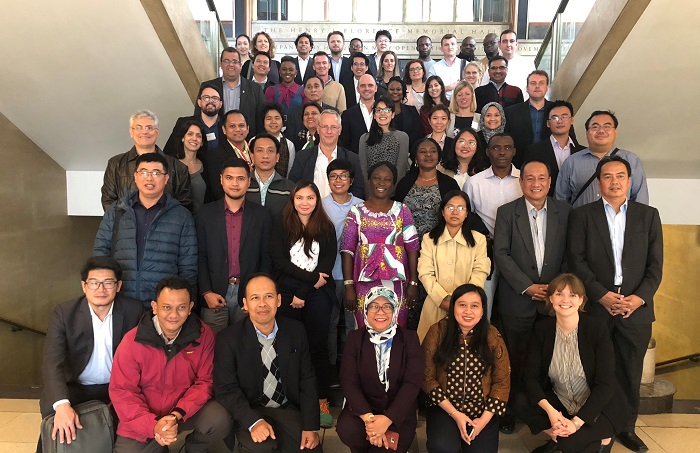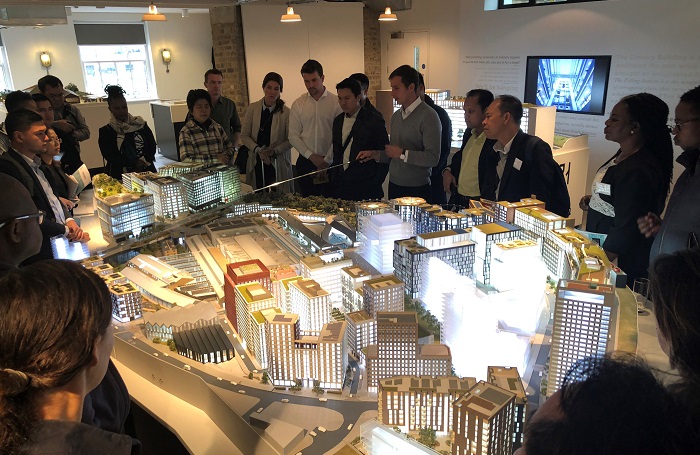UK Built Environment Advisory Group
Launched in 2016, at Habitat III in Quito, Ecuador, the UK Built Environment Advisory Group (UKBEAG) is a collaboration between the Royal Institute of British Architects, the Royal Town Planning Institute, the Institution of Structural Engineers and the Landscape Institute. Its purpose is to provide a more effective conduit for globally sharing built environment expertise. This is done together with humanitarian and development agencies such as the UK Foreign, Commonwealth & Development Office (FCDO) and UN-Habitat, on a non-profit basis and for the public good
Recent surveys have evidenced a critical lack of capacity among built environment professionals in many of the countries that are urbanising most rapidly and are among the most vulnerable to climate impacts. This is combined with a corresponding lack of educational capacity and a perceived weakness in built environment policy, eg planning policy and building code.
With a projected increase in the world’s urban population of 2.5bn by 2050 (95% of which will be in Africa and Asia), over 70% of carbon emissions are attributable to cities and 65% of the 169 targets underlying the 17 UN Sustainable Development Goals linked to territorial and urban development, the UKBEAG brings together the collective skills and expertise of over 100,000 built environment professionals in more than 150 countries around the world to support countries facing a range of issues associated with challenges such as rapid urbanisation and climate change.
Governance Arrangements & Secretariat
The UKBEAG was established as a voluntary collaboration based on an agreed Terms of Reference. Responsibility for Chairing the group rotates on a biennial basis, with the Chair-in-Office taking responsibility for administrative matters. The current Chair is occupied by IStructE, the RIBA and RTPI having previously held the role.

Case study: Global Future Cities Programme
The UKBEAG was an active contributor to the FCDO Prosperity Fund Global Future Cities Programme (GFCP), which began in 2017 and was completed in early 2022. The aim of this £80m ODA-funded programme was to promote prosperity and reduce inequality in 19 rapidly urbanising cities in 10 countries in South America, Sub-Saharan Africa, the Middle East, and Southeast Asia. The programme comprised a total of 30 interventions organised around three pillars, transportation, urban planning, and resilience. Working closely in collaboration with UN-Habitat in their role as strategic programme partners, the UKBEAG was appointed to develop and deliver the strategic capacity development component the aim of which was to use the projects as an opportunity to engage with some of the broader challenges faced by the cities, helping to better position the programme for success upon completion.
The methodology associated with the strategic capacity development component was developed in collaboration with The University of Cambridge Institute for Sustainability Leadership and the work was delivered over four years with a range of industry partners including the British Standards Institution, Connected Places Catapult, Design Council, HM Treasury Infrastructure & Projects Authority, the International Growth Centre, the Met Office, Ordnance Survey, Transport for London and the UCL Development Planning Unit, among others. It will be noted that all of these partners represent professional, independent, non-dividend distributing organisations offering independent, impartial, expert advice. In the absence of any form of legal entity, the contract for the GFCP was initially executed between UN-Habitat and the RIBA on behalf of its members.
Looking Forwards
As a result of its engagement with the GFCP, the UKBEAG has established its reputation with organisations such as the FCDO and UN-Habitat as a one-stop shop for access to the UK-built environment professions and its extensive network of partners. It is well positioned to become a trusted partner for advice and expertise in the built environment for the UK government’s international development activities globally, the UK government’s overseas missions, and the UK government’s partners in this space.

Further information
- Members of the UKBEAG formalise their commitment to cross-institute working to address the global challenges of the climate emergency, global displacement, post-conflict recovery, and rapid urbanisation through advocacy, knowledge sharing and capacity development. Read the full Memorandum of Understanding and press release.
- Tom Newby provides information on why the UKBEAG focusses on Disaster Risk Reduction and the importance of the Sendai Framework, published 01 March 2023.
- Adrian Malleson and Peter Oborn reflect on the completion of the Global Future Cities Programme, look to the future, and publish a final report on UKBEAG's capacity development activity, published 25 July 2022.
- UN Habitat Global Future Cities Programme managers Klas Groth and Naomi Hoogervorst discuss how UN-Habitat and the UK Built Environment Advisory Group are helping to achieve sustainable urbanisation in 19 cities across the globe, published 21 March 2021.
- Adrian Malleson describes the UK Built Environment Advisory Group and how UK institutes are working together as part of the Global Future Cities Programme to make urban centres more sustainable for the future, published 5 March 2021.
- Peter Oborn discusses the formation of the Global Future Cities Programme while exploring how the RIBA and its members can help deliver the UN's Sustainable Development Goals, published 5 March 2021.
- Commonwealth built environment professionals commit to working more effectively ‘Towards a Common Future’, published 20 April 2018.
- RTPI International Strategy, published 15 March 2021.
- The Institute of Structural Engineers - A targeted approach to the UN Sustainable Development goals, published 23 September 2019.
- Read the RIBA’s Ethics and Sustainable Development Commission’s final report with recommendations on how the built environment can best reflect and engage with the 2030 Sustainable Development Goals, the UN’s plan of action for people, prosperity, and the planet, published 11 December 2018.
Contact us here for more information on the UK Built Environment Advisory Group .






